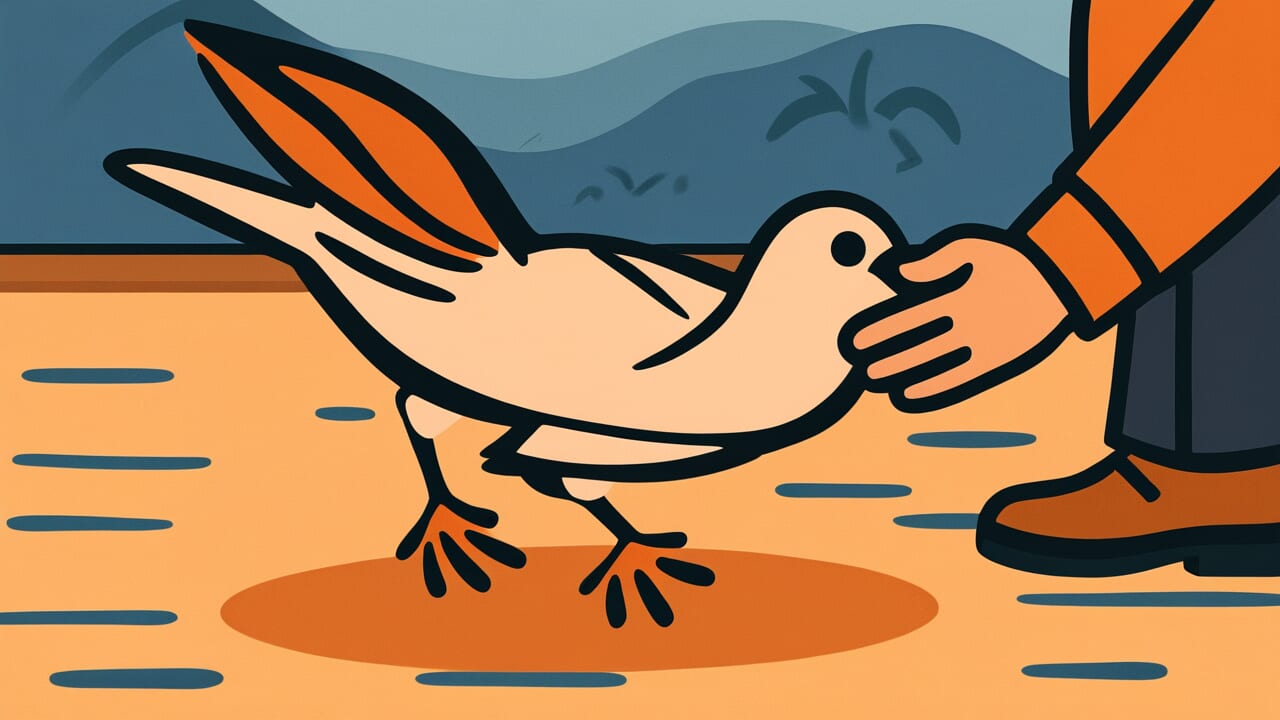How to Read “The bird at your feet flies away”
Ashimoto no tori wa nigeru
Meaning of “The bird at your feet flies away”
“The bird at your feet flies away” is a proverb that warns us about letting go of things close to us because we take them for granted. It points out how humans tend to assume that nearby chances or important things will always be available, and end up losing them.
This proverb applies when we underestimate opportunities right in front of us. We work hard on distant goals, but with people or things nearby, we think “I’ll do it later” or “I can always do it.” The proverb warns that this attitude causes us to lose what matters most.
This teaching remains vital today. Are we overlooking valuable things within reach? Time with family and friends right here, small efforts we can make now, learning opportunities close by.
We focus only on big distant goals and miss the sure chances at our feet. This proverb tells us: “Treasure what you have right here, right now.”
Origin and Etymology
No clear written records explain the origin of this proverb. However, the structure of the phrase offers interesting insights.
“Ashimoto” literally means at your feet, or very close by. “Tori” (bird) has been familiar to people since ancient times as something to catch. From the hunting era onward, catching birds was an important way to secure food.
This proverb likely comes from lessons learned through hunting experience. When aiming for distant birds, hunters prepare carefully and stay focused. But with birds at their feet, they feel “I can catch it anytime” and let their guard down.
That one moment of carelessness lets the bird escape.
Imagine an actual hunting scene. You pay close attention to distant prey, but with prey right nearby, you think “not yet, still okay.” This human psychology appears not just in hunting, but in every situation. It’s a universal tendency.
Such everyday experiences accumulated over time. The proverb was born to express this human trait: we’re most careless with what’s closest to us.
Usage Examples
- There was a great course at the nearby university, but I didn’t sign up and the registration closed. The bird at your feet flies away, exactly.
- If you don’t value relationships with coworkers you see every day, the bird at your feet flies away. Let’s communicate properly with them now.
Universal Wisdom
“The bird at your feet flies away” reveals a fundamental contradiction in human perception. We have a tendency to value distant things more and take nearby things for granted.
Why do people act this way? Because two forces work at once: we value things hard to obtain, and we become careless about things we think we can surely get.
Catching a distant bird proves our ability. Meanwhile, the bird at our feet creates a false sense of security that “I can catch it anytime.” This comfort actually scatters our attention.
This psychology appears the same way in love and work. We desperately pursue someone far away, but don’t notice the importance of someone always by our side. We pour everything into big projects, but neglect small daily tasks.
These behavior patterns are part of human nature that doesn’t change with time.
Our ancestors understood this human trait. That’s why this proverb has been passed down not as a simple warning, but as wisdom based on deep human understanding.
The moment you think something is surely yours, it has already started to escape. Knowing this truth may be what real wisdom means.
When AI Hears This
The moment you reach for the bird at your feet, your movement itself gives information to the bird. This shows an interesting problem in information theory. The act of trying to get information always leaks information to the other side too. It’s bidirectional.
When you search for a product on a website, you get price information. But at the same time, the site learns your interests. At this moment, the relationship between both parties changes.
The site might raise prices or adjust inventory. The observation target changes the moment you try to observe it.
Information theory calls this “entropy change through measurement.” The act of trying to know a system’s state affects the entire system. The same phenomenon happens in stock markets.
When many investors start researching a stock, that attention itself moves the stock price. The price before the research no longer exists.
What’s more interesting is that this information asymmetry has a time lag. The bird detects your movement in 0.1 seconds and escapes. But to measure the bird’s wariness, you must actually reach out.
As a cost of getting information, you must always reveal your intention to the other party. This is the fundamental dilemma in information warfare.
Lessons for Today
This proverb teaches modern people the importance of reconsidering the value of “what’s here and now.”
Don’t we chase only distant goals and dreams every day? Of course, having big dreams is wonderful. But if we overlook sure chances right in front of us while chasing those dreams, that’s truly wasteful.
Don’t put off until tomorrow what you can do today. Treasure the people in front of you. Don’t miss learning and growth opportunities within reach.
These small accumulations are actually the sure path to big dreams.
Modern times especially have too many choices. This makes it harder to focus on what’s in front of us. We see someone’s distant success on social media and panic. We try new things one after another and end up halfway with everything.
At such times, this old proverb teaches us: Look at your feet.
At your feet, there should be a bird you can catch right now. It may look small. But surely catching that one bird becomes solid strength for your next step.



Comments